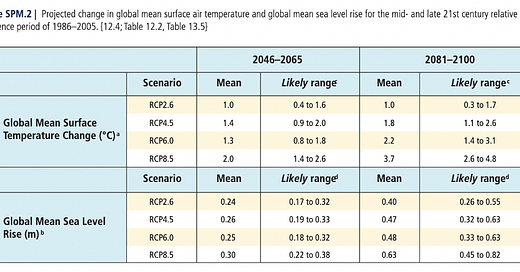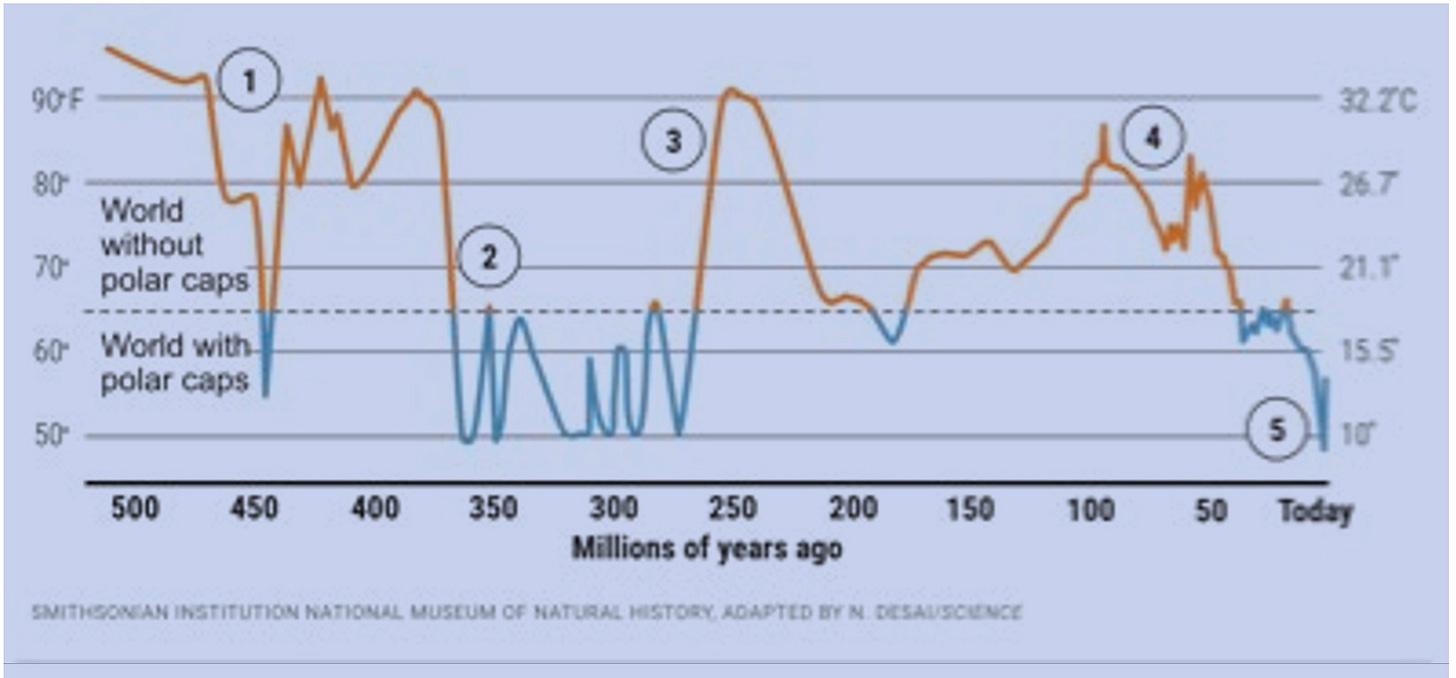The argument for doing drastic things to prevent global warming has two parts. The first has to do with reasons to think that the earth is getting warmer and that the reason is human action, in particular the production of CO2. The second is the claim that changes we have good reason to expect if we do not take appropriate action to prevent them will have very bad consequences for us.
Much of the criticism I have seen of the argument has to do with the first half, with critics arguing that the evidence for global warming, at least the evidence that it is caused by humans and will continue if humans do not mend their ways, is weak. I do not know enough to be certain that those criticisms are wrong; climate is a very complicated and not terribly well understood subject.1 But my best guess from watching the debate is that the first half of the argument is correct, that global climate is warming and human action is an important part of the cause. What I find unconvincing is the second half of the argument, the claim that climate change we have good reason to expect would have catastrophic consequences for humans.
Obviously one can imagine climate change large enough and fast enough to be a very serious problem — a rapid end of the current interglacial, for example. If, as I believe is the case, climate is not very well understood, one cannot absolutely rule out such changes.2 But most of the argument is put in terms not of what might conceivably happen but of what we have good reason to expect to happen. I think the outer bound of that is provided by the IPCC models. They suggest a temperature increase of a few degrees centigrade over the next hundred years resulting in a sea level rise of less than a meter.3
Comparing a map of global temperature to a map of population density shows densely inhabited regions with average temperatures from about 10°C to about 30°C, with some of the most densely inhabited regions at the high end of the range. I could find no empty areas that are hotter than all populated areas, hence no areas that are depopulated only because of how hot they are. If people can currently live, work, grow crops over a temperature range of twenty degrees it is hard to imagine any reason why most of them couldn't continue to do so about as easily if average temperature shifted up by two or three degrees, with a century to adjust to the change.
That raises the question with which I titled this post: Does climate change catastrophe pass the giggle test? Is the claim that climate change on that scale would have catastrophic consequences one that a reasonable person should take seriously?
I can see two ways of defending such a claim. The first is some argument to show that present arrangements are, due to divine intervention or some alternative mechanism, optimal, so that any deviation, even a small one, can be expected to make things worse. That claim is implicit in some of the rhetoric but I have never seen anyone actually state and defend it. The second and more plausible is the observation that people have adapted their activities, the sorts of houses they live in, the crops they grow, to current conditions. Put in economic terms, we have sunk costs in our present way of doing things. Even if the planet has not been optimized for us, we have optimized our activities for the particular part of the planet where we live and the details of the optimization depend in part on the local climate. Any change in either direction, warming or cooling, can be expected to make our present way of doing things less well adapted to the new conditions.
That would be a persuasive argument if we were talking about a substantial change occurring over a short period of time but we aren't. We are talking about a not very large change occurring over a century. In the course of a century, many existing houses, in the U.S. most, will be replaced. If temperatures are rising they will be replaced with houses designed for a slightly warmer climate. If sea levels are rising, houses in low lying coastal areas that are too close to the coast will be replaced with houses a little farther inland.4 Over a century, farmers will change the crops they are growing multiple times in response to new crop varieties, shifting demand, and similar changes. If temperatures are rising that will include shifting to crops adapted to a slightly warmer climate.
Climate aside, we do not live in a static world — consider the changes that have occurred over the past century. The shifts we can expect to occur due to technological progress alone, even without allowing for political and demographic changes, are much larger than the shifts required to deal with climate change on the scale I am discussing.
A possible response is that, while changes to be anticipated over the next century will not produce catastrophe, changes over a much longer period will.
If we burned all the coal, oil and gas that’s left in the ground, we’d melt Antarctica and global sea levels would rise as much as 60 meters (200 feet) over the next ten thousand years. Coastal cities from New York to Shanghai would wind up deep underwater. (One of multiple news stories reporting on a journal article.)
If that happened today or even by the end of the century it would indeed be a catastrophe, but ten thousand years is long enough to make any description of what humans will be doing and able to do that far into the future a wild guess.
A different version of the catastrophist argument is the claim that climate is unstable, that an increase of a few degrees could trigger a much larger increase. That might be plausible if current temperatures were so high that additional warming would raise them above any in the past. But although present temperatures may be higher than any in the past two thousand years, as discussed in an earlier post, the Earth is much more than two thousand years old.
The graph below5 shows estimated global temperature over the past five hundred million years. While present temperature is high relative to the recent past it is cool relative to the more distant past, more than thirteen degrees below the high of the past hundred million years.
We are currently in an ice age, defined by geologists as a period when there is an ice cap on one or both poles. For most of the past five hundred million years there wasn’t.
The claim that we have good reason to expect climate change on a scale that will produce not merely problems for some but catastrophe for many is one that no reasonable person should take seriously.6
Past posts, sorted by topic
A search bar for past posts and much of my other writing
As some evidence, as of 2018 the temperature projections produced by the IPCC’s elaborate analysis did a somewhat worse job of predicting actual temperature than a straight line fit from the date when warming restarted after the midcentury pause to the date of each of the first four IPCC reports.
We cannot absolutely rule out catastrophic changes either caused by anthropogenic warming or prevented by anthropogenic warming. There is, in fact, some evidence, discussed in an earlier post, that the reason the next glaciation is not already starting is anthropogenic warming — not current warming due to the industrial revolution but warming that started some eight thousand years ago due to the invention of agriculture.
From Future Climate Changes, Risks and Impacts. RCP8.5 was originally designed as an upper bound on how high future CO2 emissions might be and assumed a level of world population growth that, so far, is not occurring, so should probably not be included.
Only a little farther inland. In most places the projected sea level rise by the end of the century would shift coastlines in by less than a hundred meters.
The headline of the news story I found it in: “A 500-million-year survey of Earth's climate reveals dire warning for humanity.”
If life gives you peaches, make cyanide from the pits.
The weaker claim that climate change will produce net costs for humans is, in my view, less obviously true than many believe. For reasons see my past posts on the subject.





I am with you, in particular on the idea that the public policy proposals of the leftists here are for the most part insane.
But to steelman the one legit/reasonable leftist argument, the focus should be on the (small) probability that the destabilized (2 then 3 degrees of warming which then leads to rapid acceleration from there…) case might occur.
And you and I at least probably agree that the chance is small. But non-zero.
But then you need to ask the 3rd question: will the leftist policy prescriptions be the difference between avoiding that “destabilized” case or not. The Paris Accords if implemented fully by everyone will supposedly reduce global average temperatures by between 0.1 and 0.3 degrees. What are the odds that THAT would be the difference between destabilization and not? Vanishingly small imo. And the odds that the world would agree on the energy consumption reduction needed to *actually* have a chance of making the difference between destabilization and not are also incredibly tiny.
And THAT is my issue with most of the leftist policy prescriptions here - especially the immoral immediate constriction of supply of fossil fuels preventing the billions of the world’s poorest from better access to highly available reliable low cost energy. The chances they will actually help are minimal, but the harm to the overall economy, and especially to the world’s poorest in the short and medium term, is significant.
On the assumption, implicit or explicit, that the recent/pre-industrial temperature is optimal, see Roger Pielke's piece: https://rogerpielkejr.substack.com/p/when-the-climate-was-perfect